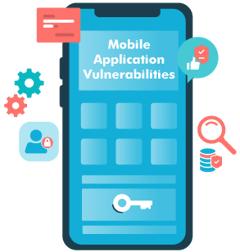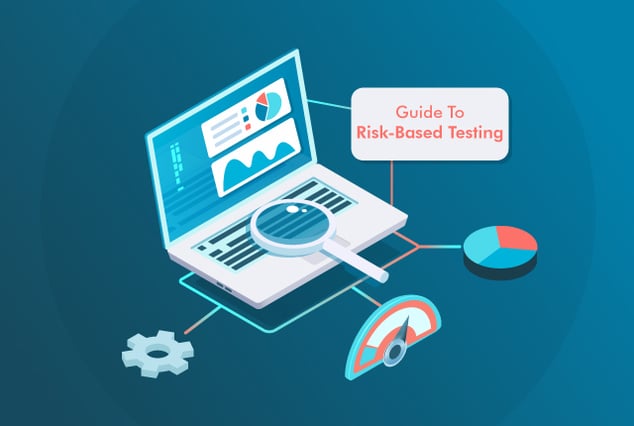Businesses rely on mobile apps more than ever. In this edition of the expert series, we will discuss the common mobile application vulnerabilities along with their resolutions.

Mobile applications have transformed how we interact with technology in smartphones and digital connectivity. As a result, tasks have become more manageable, information is more accessible, and services have become more convenient. However, the rapid proliferation of mobile apps has brought about a parallel rise in mobile application vulnerabilities, posing severe threats to user privacy, data security, and digital trust.
Understanding Mobile Application Vulnerabilities
Mobile application vulnerabilities are security weaknesses that malicious actors can exploit to compromise the integrity, confidentiality, and availability of user data and the application itself. These vulnerabilities can arise due to flawed coding practices, inadequate security measures, and the increasing complexity of mobile environments.
A massive number of app-related data breaches have taken place lately. Some of the most significant violations include:
-
Weak Server-Side Controls
The main reasons for server-side control issues are:
- Frequent updates and teams rushing to market.
- We expect the mobile operating system to take complete responsibility for mobile app security.
-
Insecure Data Storage
Storing personal or sensitive data, such as credit card numbers or passwords, requires a secure mechanism. Developers use files and databases to store data on the client side in mobile apps, assuming that will restrict users from accessing the data.
Attackers can easily root or jailbreak the mobile device and compromise the security of mobile apps.
-
Unintended Data Leaks
Common data leakage points that you should monitor:
- Copy/paste buffer caching
- Browser cookie objects
- URL caching
- Keyboard press caching
- Data analytics shared with third-parties
-
Poor Authorization and Authentication?
PIN codes are being used in most mobile apps for authentication. It’s an insecure practice as PIN codes are stored on the mobile device, and attackers can steal this data quickly.
-
Improper Session Handling
OAUTH tokens and cookies are used for session management in mobile apps. Effective session handling should make a mobile app authenticate users through the backend and then issue a session cookie to the mobile app.
-
Code Tampering
It allows attackers to change the code of an app, which is used to launch malicious attacks.
-
Reverse Engineering
This process decomposes an app's code to reveal its inner workings. This information can then be used to find and exploit vulnerabilities.
-
Insecure Communication
It allows attackers to intercept or modify data as it is being transmitted between the app and a server.
Prevention Against Modern Mobile Application Vulnerabilities
Let's explore a set of strategic pointers designed to prevent and mitigate modern mobile application vulnerabilities.
- Implement Strong Authentication and Authorization: Robust authentication mechanisms, such as biometric and multi-factor authentication (MFA), can thwart unauthorized access attempts, reducing the risk of credential-based attacks like StrandHogg.
- Secure Data Storage and Transmission: Employ end-to-end encryption for sensitive data at rest and in transit. This approach can safeguard user information from potential attackers, even if they gain access to the device or network.
- Regular Security Testing: Regularly conduct comprehensive security assessments, including penetration testing and vulnerability scanning, to proactively identify and address potential vulnerabilities within your app.
- Update and Patch Regularly: Stay vigilant with updates and patches for your app and the underlying operating system. This can help mitigate vulnerabilities exposed in older versions.
- Restrict Permissions: Request only necessary permissions from users and ensure they are well-informed about the reasons for granting them. Restrict access to sensitive device features to minimize the attack surface.
- Educating Users: Users should be educated about the risks of mobile application vulnerabilities. They should be careful about what apps they install and what permissions they grant to those apps.
Best Practices in Mobile Application Security
Now, let's delve into the best practices that form the bedrock of mobile app security in the face of contemporary challenges:
Ensure Source Code Encryption
Any reverse engineering attack or tampering can be defended by encrypting the source code.
Perform Penetration Tests and Thorough QA
Pen testing is highly recommended to expose mobile app security vulnerabilities.
Secure the Data-in-Transit
Use SSL or VPN tunnel for secured data transmission.
Use Latest Cryptography Techniques
Use encryption techniques like AES with 512-bit and 256-bit encryption.
Zero-Trust Approach
Embrace zero-trust, where no user or device is automatically trusted, enhancing dynamic security across diverse contexts.
Runtime Protection (RASP)
Integrate RASP for real-time app monitoring, detecting and thwarting attacks like code injection and data leaks.
Containerization
Isolate app components through containerization and sandboxes, limiting vulnerabilities' impact on the entire app.
Security by Design
Infuse security into the development stages, practicing secure coding and rigorous code reviews for fortified architecture.
Continuous Monitoring
Establish robust monitoring to detect and respond to security incidents promptly, ensuring app resilience post-launch.
Use a Secure Deployment Process
This includes using a secure file transfer protocol, encrypting app data, and using an unassailable certificate authority.
Conclusion
As we continue to rely on mobile apps for various aspects of our lives, a proactive approach to mobile application security will be the cornerstone of a safer and more secure digital future. In a mobile-centric world, app vulnerabilities pose serious threats. Robust security measures are crucial, including strong authentication, encryption, and regular updates. Educating users, employing advanced techniques like source code encryption, and adhering to best practices are key to fortifying mobile apps and ensuring a secure digital future. To learn more, get in touch now.
Have Suggestions?
We would love to hear your feedback, questions, comments and suggestions. This will help us to make us better and more useful next time.
Share your thoughts and ideas at knowledgecenter@qasource.com



